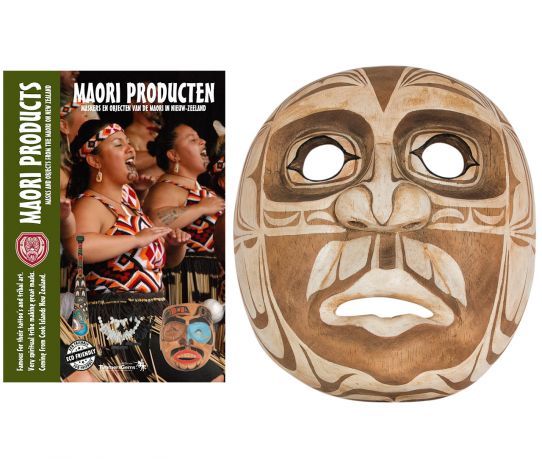We use cookies to make your experience better.
Maori mask by hand and made from New Zealand.
The Māori are the indigenous Polynesian people of New Zealand. Māori originated with settlers from eastern Polynesia, who arrived in New Zealand in several waves of canoe voyages some time between 1250 and 1300.Over several centuries in isolation, the Polynesian settlers developed a unique culture, with their own language, a rich mythology, and distinctive crafts and performing arts. Early Māori formed tribal groups based on eastern Polynesian social customs and organisation. Horticulture flourished using plants they introduced; later, a prominent warrior culture emerged. The arrival of Europeans to New Zealand, starting in the 17th century, brought enormous changes to the Māori way of life. Māori people gradually adopted many aspects of Western society and culture. Initial relations between Māori and Europeans were largely amicable, and with the signing of the Treaty of Waitangi in 1840, the two cultures coexisted as part of a new British colony. Rising tensions over disputed land sales led to conflict in the 1860s. Social upheaval, decades of conflict and epidemics of introduced disease took a devastating toll on the Māori population, which fell dramatically. By the start of the 20th century, the Māori population had begun to recover, and efforts have been made to increase their standing in wider New Zealand society and achieve social justice. Traditional Māori culture has thereby enjoyed a significant revival, which was further bolstered by a Māori protest movement that emerged in the 1960s. In the 2013 census, there were approximately 600,000 people in New Zealand identifying as Māori, making up roughly 15 per cent of the national population. They are the second-largest ethnic group in New Zealand, after European New Zealanders ("Pākehā"). In addition, more than 140,000 Māori live in Australia. The Māori language is spoken to some extent by about a fifth of all Māori, representing 3 per cent of the total population. Māori are active in all spheres of New Zealand culture and society, with independent representation in areas such as media, politics and sport. Disproportionate numbers of Māori face significant economic and social obstacles, and generally have lower life expectancies and incomes compared with other New Zealand ethnic groups. They suffer higher levels of crime, health problems, and educational under-achievement. A number of socioeconomic initiatives have been instigated with the aim of "closing the gap" between Māori and other New Zealanders. Political and economic redress for historical grievances is also ongoing (see Treaty of Waitangi claims and settlements).
| Dimensions | 200-230mm |
|---|












